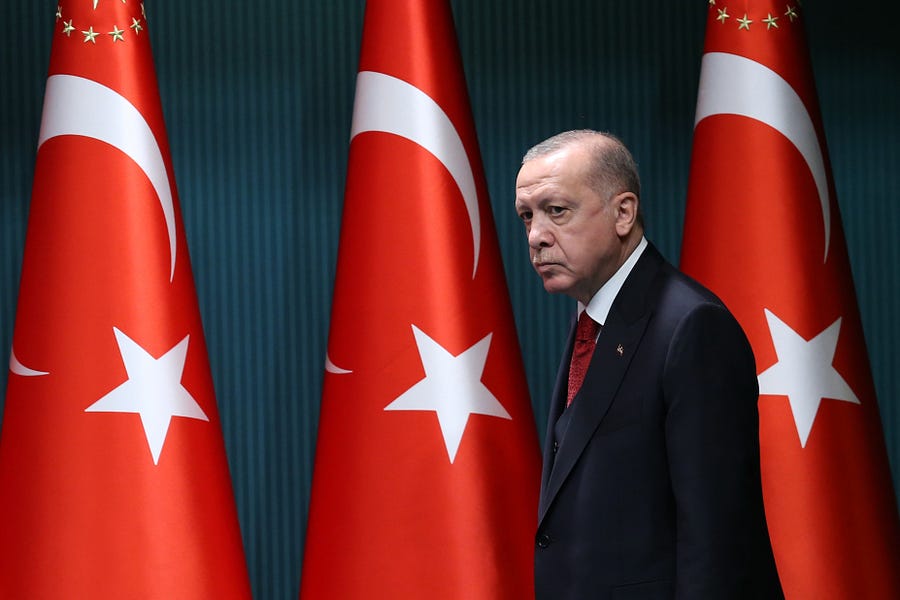Last October, Turkish President Recep Tayyip Erdoğan suggested that French President Emmanuel Macron ought to seek “some sort of mental treatment,” after the latter had announced a tougher stance on radical Islam. Tensions between Turkey and France have been rampant since the beheading of French civics teacher Samuel Paty, who was targeted for showing caricatures of the Prophet Mohammed to his students. On top of that, Paris strongly supports Greece in its border dispute with Ankara—having dispatched its Charles de Gaulle aircraft carrier to the Eastern Mediterranean Sea late last summer to patrol Greek territorial waters. Turkey and Greece have long had near-war scenarios over the territorial situation of Greek islands—in 1996, the military escalation of Imia was only avoided after a U.S. envoy brokered a ceasefire.
It isn’t only the French-Turkish relationship that has had a rough patch in the last few months. Turkey has cultivated strong feelings of dislike all around. Its intervention in the conflict between Armenia and Azerbaijan over the Nagorno-Karabakh region upset Russia, which has never gotten over the 2015 downing of one of its fighter jets. Erdoğan’s intervention in the Syrian civil war has also angered the international community, which is increasingly becoming aware of the neo-Ottoman approach of the Turkish presidency.
Turkey is also accused of breaking the arms embargo in Libya, breaking long-term NATO traditions by acquiring Russian military equipment, and cozying up to terrorist organizations such as Hamas and Hezbollah in its open provocations against Israel. Domestically, Erdoğan is dealing with record-high inflation, student protests against his authoritarian power grabs in academic institutions as well as his anti-LGBT platform, and an abysmal human rights record. The offices of opposition parties are being raided, often on loosely assembled charges. Turkey’s recent exit from the Istanbul Convention—an international treaty fighting violence against women—once again underlines how he intends to transform a secular country into a more deeply conservative and nationalistic entity.
And yet, the European Union in its most recent European Council meeting failed to reach any type of firm conclusions on Turkey. In this meeting, the EU pointed out the ongoing dispute between Turkey and Greece over territorial waters and airspace, as well as the ongoing Turkish occupation of Northern Cyprus. Yet it deemed no immediate consequences to be necessary. Instead, EU leaders called for strengthened cooperation with Ankara, including on issues related to migration.
The EU has long considered Turkey as an accession candidate to its organization. This candidate status comes with perks: 9 billion euros ($10.6 billion) since 2007, on top of a customs deal that allows for some goods to be freely traded. Another 6 billion euros ($7.1 billion) came in 2016, when the EU was begging Turkey to keep millions of Syrian refugees from reaching its shores. Erdoğan has made use of this dependency, not least by threatening to send refugees to the Greek and Bulgarian borders if Europe labels its intervention in Syria an occupation.
The problems with Turkey strike at the core of Europe’s headache with foreign relations. Brussels rejects the bigger-army diplomacy of the United States, and sees itself as a middleman in the unruly fights between East and West. To the EU, there is no fight that cannot be solved over coffee in Berlin or croissants in Paris. The results of this approach have been underwhelming: Turkey has no interest in a military conflict with a EU member state, or a NATO ally for that matter, but the constant tension-building buys it the diplomatic currency to go another three months without sanctions. Meanwhile, President Erdoğan reaps the benefit of trade with Europe, while making no firm commitments to improving relationships with the West. His confidants travel the old continent unbothered—no sanctions apply to them, as journalists investigating the state spend years in jail.
Some crises are narrowly avoided—the European way. When German-Turkish journalist Denis Yücel was imprisoned in Turkey for espionage and for “insulting the president,” Germany attempted to make the case that his dual citizenship (German and Turkish) would protect him from prosecution. A year into his prison sentence, Yücel was released under international pressure. Turkish nationals who do not benefit from the support of a European trading partner do not get the same privilege.
Europe is missing out on the opportunity of the Biden administration. Under Donald Trump, the Turkish government saw the United States as a manageable actor. Joe Biden has taken a harder stance toward Ankara, allowing Europe to find an ally. Instead, Brussels remains unable to make firm commitments. Countries targeted by its newly adopted European Magnitsky Act include Belarus, with which trade is negligible. Meanwhile, no sanctions against high-ranking officials or benefactors of Erdoğan’s crony capitalism, not even the suggestion that the customs union between the EU and Turkey could be at play. Instead, so say the European Council conclusions on March 25, “we appreciate Turkey’s hosting of 4 million refugees” and “the European Council will revert to this matter at its meeting in June.”
Accountability will have to wait until then at least.








Please note that we at The Dispatch hold ourselves, our work, and our commenters to a higher standard than other places on the internet. We welcome comments that foster genuine debate or discussion—including comments critical of us or our work—but responses that include ad hominem attacks on fellow Dispatch members or are intended to stoke fear and anger may be moderated.
You are currently using a limited time guest pass and do not have access to commenting. Consider subscribing to join the conversation.
With your membership, you only have the ability to comment on The Morning Dispatch articles. Consider upgrading to join the conversation everywhere.